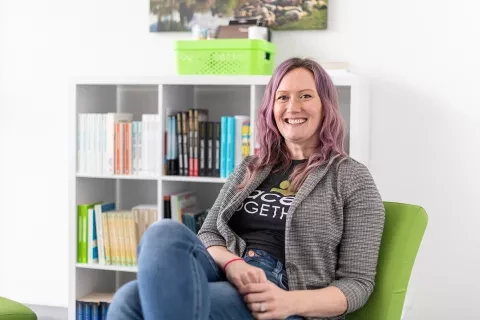April 27, 2023
Q: How do I keep my parent with addiction in my life?
A: This is a great question because we’re usually just told to disconnect and walk away. As the daughter of someone who has addiction and severe mental health issues, I’ve been told to cut my mom out of my life more times than I can count. What people don’t understand is that really isn’t an option for a lot of us. We don’t want to walk away from someone we care about, addiction or not.
It took a long time for me to get to the place I am today with my mom. I had to learn to accept her how she is, not how I wish she would be. I realized it’s not my job to make her better and it’s not my place to determine what better even is. I can support her in ways that are in line with what she wants for herself, not what I want for her.
It’s incredibly hard to watch someone you love make unhealthy decisions. For so long, I thought it was my job to “fix” her. That approach didn’t work and it made her feel attacked in some ways. By not accepting her as she was, it gave her the feeling that something was wrong with her. That’s certainly not what I wanted.
If you want to keep your parent in your life, think hard about what you’re OK with and what’s not OK for you to be around. You’ll have to set boundaries, which may hurt, but they’re key for your safety and peace of mind.
My mom knows I’ll remove myself if she does certain things. For example, when she talks about things that make me uncomfortable, and she’s unwilling to stop, I’ll leave the situation. I’ll say, “I love you, but I have to go.” We’ve had conversations about my boundaries and she’s seen them in action. It’s been helpful for our relationship because she knows what I’ll stick around for and what I won’t. I’ve also set the boundary that I won’t drop everything and go to her when she’s in crisis. She used to make things up so I’d give her money or a ride. I’ll still help her, but I won’t turn my life upside down the instant I get a call or make her emergency my emergency.
When we were first rebuilding our relationship, I used to meet my mom at her house or in public places, not my house. That made it easier to leave if something went wrong. It’s something I’d highly recommend as you’re setting new boundaries – it gives you control over your situation and may curb some behaviors.
There are times I’ve had to step back from my relationship with my mom, usually after she lashed out at me or caused harm to those around me. It didn’t mean I couldn’t re-engage with her in the future, but it let her know I wasn’t going to tolerate harmful behavior.
You may be in a family with siblings who disagree with how you’ve chosen to handle your relationship. Thankfully, my siblings and I have generally been on the same page when it comes to our mom. We’ve all had times when we didn't talk to her and times when we have. We all still want her to know that we love her. There’s been no judgment between us because we’ve all had similar experiences and know what it's like to be too close to her. If your siblings aren’t supportive of your relationship, remember that it’s your choice. These are your boundaries. I’ve had so many people tell me that I just need to cut my mom out. It’s so frustrating. Each time, I explain that isn't what I want. She’s my mother and that means something to me. You need to make the choice that you feel OK about at the end of the day.
This question really comes down to what this relationship is worth to you. You’ll need to accept the fact that you can’t control whether they use or don’t use. Do you want a relationship with the person they are now? Remember that you can only control yourself, no one else. No matter how badly you want things to be different, it’s up to your parent to make those choices.
None of this is easy. There’s so much pain associated with someone you care about making choices they wouldn’t normally. There is some good news: the support systems people have can be huge motivators to make change. Caring for someone and accepting them as they are – with boundaries – will do much more than rejecting or demonizing them.
It’s possible to reduce conflict, adjust your communication style and model positive change for your parent. These strategies are exactly what we work on in loved one peer coaching. If you’d like more personalized guidance, please reach out to our peer team.

